“Help! My memory card is not showing pictures on my computer. I just got back from a fantastic vacation and was excited to transfer all my photos to my laptop, but now I can't see any of them. Is there any way to recover these precious memories?"
The good news is that in most cases, your pictures aren't actually gone – they're just not visible due to various technical issues. In this comprehensive guide, we'll explore why your SD card card is not showing pictures on computer and provide you with 8 effective fixes to resolve this problem.
In this article
-
- Fix 1: Toggle SD Card Write Protection
- Fix 2: Remove and Re-insert the SD Card
- Fix 3: Change the SD Card Drive Letter
- Fix 4: Run the CHKDSK Command
- Fix 5: Uninstall the SD Card Disk Drivers
- Fix 6: Unhide Photos in File Explorer
- Fix 7: Run Windows Hardware and Devices Troubleshooter
- Fix 8: Format the SD Card
- Part 4: Simple Tips To Fix Memory Card Not Showing Pictures On Computer
Part 1: SD Card Not Showing Pictures On Computer? Here's Why!
Wondering why “Pictures won't load from my SD card”? Here are a few reasons:
screen crashes:
|
Reason |
Description |
|
Write Protection |
The SD card's write protection switch is enabled, preventing access to files. |
|
Loose Connection |
The SD card is not properly inserted or the card reader has a poor connection. |
|
Drive Letter Conflict |
The SD card is assigned a drive letter that conflicts with another device. |
|
File System Errors |
Corrupted file system or bad sectors on the SD card. |
|
Outdated or Corrupted Drivers |
The SD card reader drivers are outdated or corrupted. |
|
Hidden Files |
The photos are hidden due to system settings or malware. |
|
Hardware Issues |
Problems with the SD card reader or the card itself. |
|
Formatting Issues |
Incorrect formatting or partial formatting of the SD card. |
Understanding these reasons will help you identify the root cause of why your memory card is not showing pictures on your computer, making it easier to apply the appropriate fix.
Part 2: Photos on SD card not showing on Computer? Try These Effective Solutions.
Now that we've identified potential causes, let's explore 8 effective solutions to fix the issue of pictures on SD card not showing on the computer.
Fix 1: Toggle SD Card Write Protection
SD cards have a physical write protection switch that, when enabled, prevents any changes to the card's contents. Sometimes, this switch can accidentally be moved to the "locked" position, causing your computer to treat the card as read-only or even completely inaccessible.
Here’s how to fix the SD card not showing pictures on computer problem:
Step 1: Locate the write protection switch on the side of your SD card. If the switch is in the "locked" position (usually towards the connectors), slide it to the "unlocked" position.

Step 2: Re-insert the SD card into your computer. Check if your photos are now visible.
By ensuring that write protection is disabled, you allow your computer full access to the SD card, potentially resolving the issue of memory card not showing pictures on computer.
Fix 2: Remove and Re-insert the SD Card
Sometimes, a simple connection issue can prevent your computer from properly reading the SD card. Removing and reinserting the card can re-establish the connection and force your computer to recognize the device properly.
Here’s how to fix the SD card not showing pictures on computer issue:
Step 1: Safely eject the SD card from your computer. Wait for about 30 seconds. Clean the metal connectors on the SD card with a soft, dry cloth.

Step 2: Re-insert the SD card into your computer's card reader or adapter. Wait for your computer to detect the card and check if the pictures are now visible.
This simple action can often resolve issues where photos on SD card are not showing on computer due to connection problems.
Fix 3: Change the SD Card Drive Letter
Pictures on SD card not showing on computer? Well, occasionally, Windows may assign a drive letter to your SD card that conflicts with another device or reserved system drive. Changing the drive letter can resolve this conflict and make your pictures visible again.
Steps to change the SD card drive letter:
Step 1: Right-click on the Windows icon and select "Disk Management." Locate your SD card in the list of drives. Right-click on the SD card. Select "Change Drive Letter and Paths".

Step 2: Click "Change" and assign a new drive letter from the drop-down menu. Click "OK" to confirm the change. Check if your photos are now accessible.
By assigning a unique drive letter, you ensure that your computer can properly access the SD card, potentially fixing the issue of SD card not showing pictures on computer.
Fix 4: Run the CHKDSK Command
The CHKDSK (Check Disk) command is a built-in Windows utility that can scan your SD card for file system errors and bad sectors. Running this command can repair many issues that might be preventing your pictures from showing up.
Steps to run the CHKDSK command:
Step 1: Press Windows key + X and select "Command Prompt (Admin)" or "Windows PowerShell (Admin)." Type "chkdsk X: /f" (replace X with your SD card's drive letter) and press Enter.

Step 2: Wait for the scan to complete. If prompted to schedule a scan on next restart, type "Y" and press Enter. Check if your photos are now visible.
Running CHKDSK can fix file system errors that might be causing your memory card to not show pictures on computer, potentially recovering access to your photos.
Fix 5: Uninstall the SD Card Disk Drivers
Outdated or corrupted SD card drivers can prevent your computer from properly reading the card's contents. Uninstalling these drivers forces Windows to reinstall them, potentially resolving any driver-related issues.
Steps to uninstall SD card disk drivers:
Step 1: Right-click on the Start button and select "Device Manager." Expand the "Disk drives" category. Right-click on your SD card. Select "Uninstall device."

Step 2: Click "Uninstall" to confirm. Restart your computer.
Windows will automatically reinstall the drivers upon restart. Check if your pictures are now visible.
By refreshing the SD card drivers, you can often resolve issues where pictures won't load from your SD card due to driver conflicts or corruption.
Fix 6: Unhide Photos in File Explorer
Sometimes, system settings or malware can cause your photos to be hidden. Adjusting File Explorer settings to show hidden files can make these invisible photos reappear.
Steps to unhide photos in File Explorer:
Step 1: Open File Explorer and click on the "View" tab. Click on “Show” and then “Hidden Items".

Step 2: Uncheck "Hide protected operating system files (Recommended)." Click "Apply" and then "OK." Navigate to your SD card and check if your photos are now visible.

This fix can reveal photos that were hidden due to system settings or malicious software, resolving the issue of memory card not showing pictures on computer.
Fix 7: Run Windows Hardware and Devices Troubleshooter
Windows has a built-in troubleshooter that can automatically detect and fix common hardware and device problems. Running this troubleshooter can identify and resolve issues preventing your SD card from showing pictures.
Steps to run Windows Hardware and Devices Troubleshooter:
Step 1: Press Win + R, and type the following command. This will launch the Hardware and Devices Troubleshooter.
msdt.exe -id DeviceDiagnostic

Step 2: Follow the on-screen instructions to run the hardware and devices troubleshooter.

The troubleshooter can automatically fix many common issues that cause photos on SD card to not show on computer, saving you time and effort in manual troubleshooting.
Fix 8: Format the SD Card
As a last resort, formatting the SD card can resolve persistent file system issues or corruption. However, this method will erase all data on the card, so it should only be used after trying all other options and backing up any accessible data.
Steps to format the SD card:
Step 1: Open File Explorer and right-click on your SD card. Select "Format." Choose the file system (preferably exFAT for large SD cards).

Step 2: Check "Quick Format" to perform a full format. Click "Start" and confirm the formatting process. Wait for the format to complete. Check if you can now access and save new photos to the card.
If you have important photos on the card, consider using data recovery software before formatting.
Part 3: Lost Pictures Due to Formatting SD Card? Try Recoverit Today!
If you've formatted your SD card or tried other fixes without success, don't lose hope. There are specialized data recovery tools designed to recover lost or deleted photos from memory cards. One such tool is Recoverit, which can help you retrieve pictures that won't load from your SD card.
Recoverit is a powerful data recovery software that can scan your SD card for lost photos, even after formatting. It supports various file types and can recover data from different scenarios, including accidental deletion, formatting, and file system corruption.
Steps To use Recoverit:
Step 1: Install Recoverit on your computer. Launch the software and connect your SD card.
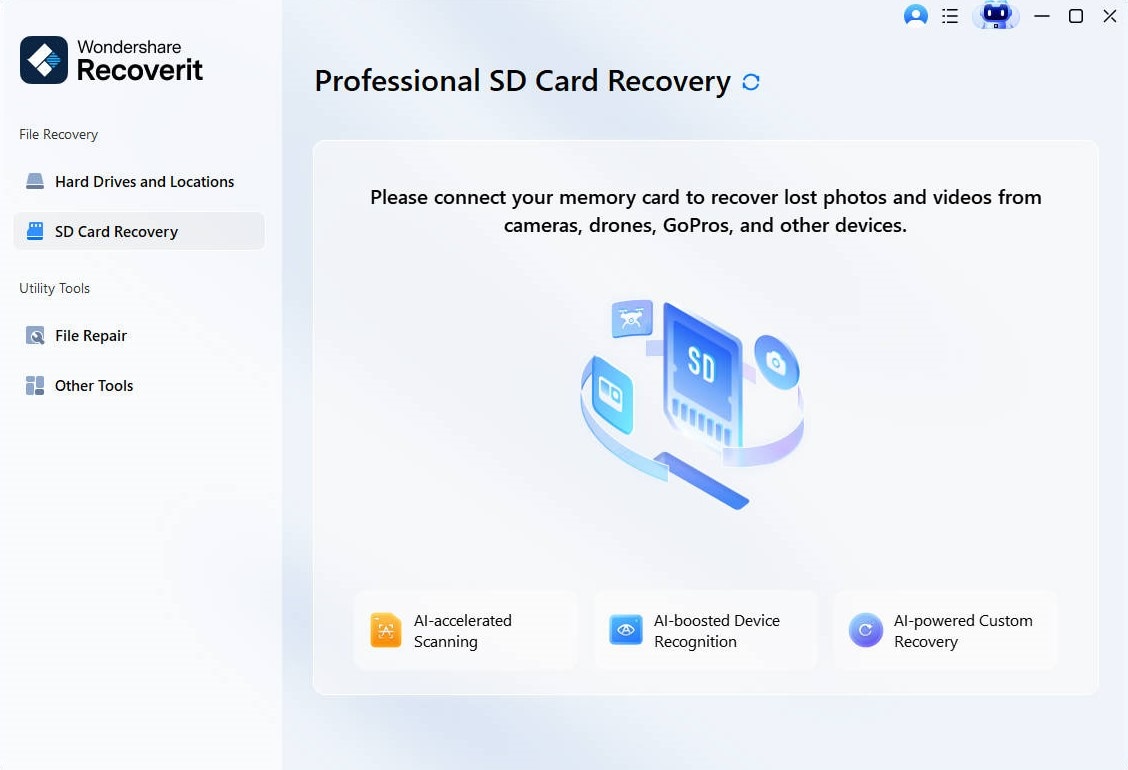
Step 2: Hit the “Scan” button placed next to the SD card.
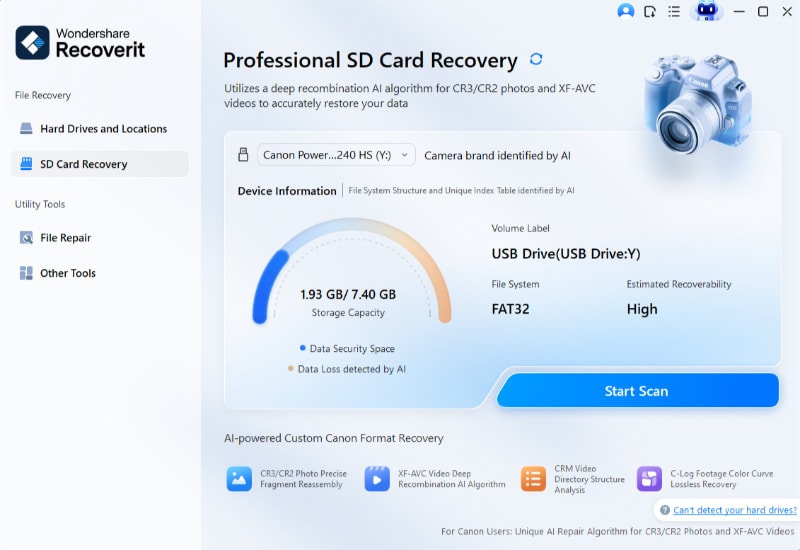
Step 3: The scanning process will take some time.
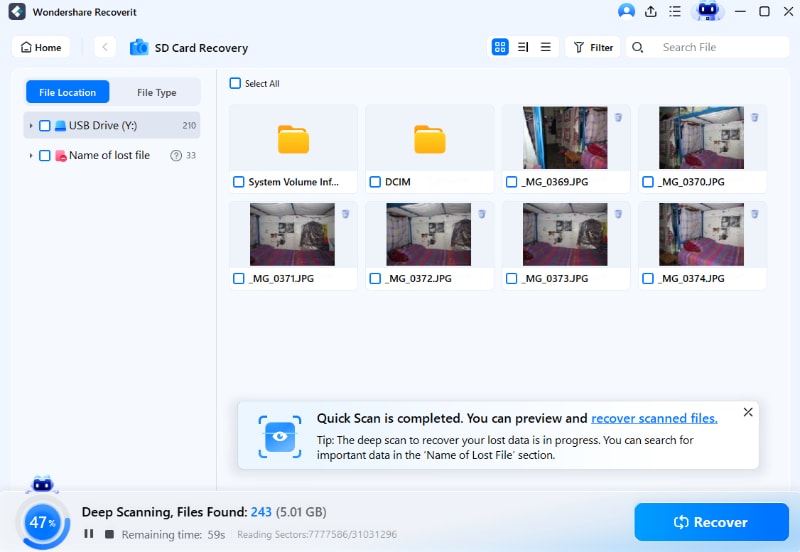
Step 4: Preview the recoverable files and select the ones you want to restore. Click "Recover" to save the selected photos to a safe location on your computer.
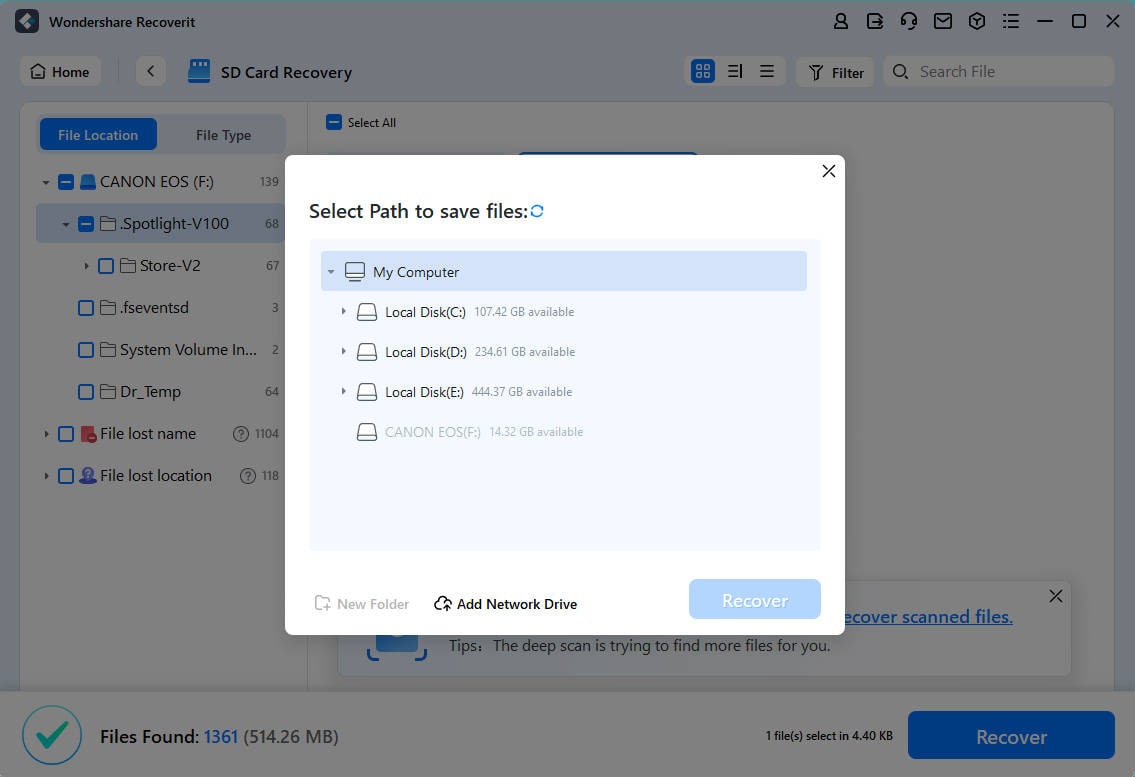
Remember, when dealing with a memory card not showing pictures on computer, it's crucial to stop using the card immediately to prevent overwriting potentially recoverable data.
Part 4: Simple Tips To Fix Memory Card Not Showing Pictures On Computer
To prevent future issues with your SD card and ensure your photos remain accessible, consider these simple tips:
- Always use the "Safely Remove Hardware" option before disconnecting your SD card.
- Regularly back up your photos to multiple locations (e.g., cloud storage, external hard drive).
- Keep your SD card drivers and operating system up to date.
- Avoid exposing your SD card to extreme temperatures or moisture.
- Use reputable antivirus software to prevent malware from affecting your SD card.
- Periodically check your SD card for errors using built-in tools like CHKDSK.
- Avoid filling your SD card to maximum capacity; leave some free space.
- Use high-quality, reputable brands for SD cards and card readers.
By following these tips, you can minimize the chances of encountering issues where photos on SD card are not showing on computer in the future.
Conclusion
Encountering the memory card not showing pictures on computer can be a stressful experience, especially when you're worried about losing precious memories.
However, as we've seen in this comprehensive guide, there are numerous solutions available to fix this common problem.
By understanding the causes behind this issue and knowing how to address them, you can confidently tackle any future problems with your SD card. With these tips and solutions at your disposal, you'll be well-equipped to handle any situation where pictures won't load from your SD card.
Try Wondershare Recoverit to Perform Data Recovery

FAQ
-
Why are my photos on SD card not showing on computer even though the card is detected?
This issue can occur due to various reasons, including write protection, file system errors, or hidden files. Try toggling the write protection switch, running CHKDSK, or adjusting File Explorer settings to show hidden files. If these don't work, consider using data recovery software to scan for and recover your photos. -
Can I recover pictures from a formatted SD card?
Yes, it's often possible to recover pictures from a formatted SD card using specialized data recovery software like Recoverit. These tools can scan the card for remnants of deleted files and restore them. However, it's crucial to stop using the card immediately after realizing the photos are missing to prevent overwriting potentially recoverable data. -
How can I prevent my SD card from not showing pictures on computer in the future?
To prevent future issues, always safely eject your SD card before removing it, keep your drivers up to date, regularly back up your photos, avoid exposing the card to extreme conditions, and use reputable antivirus software. Additionally, periodically check your SD card for errors and avoid filling it to maximum capacity to maintain optimal performance.
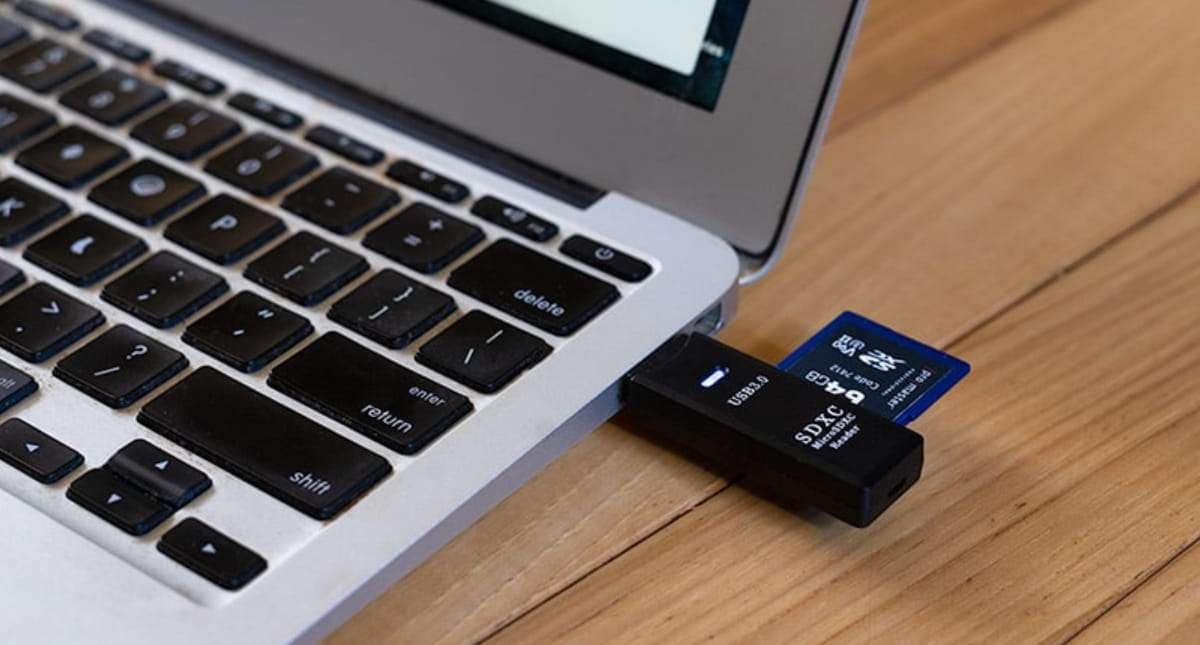



 ChatGPT
ChatGPT
 Perplexity
Perplexity
 Google AI Mode
Google AI Mode
 Grok
Grok






















